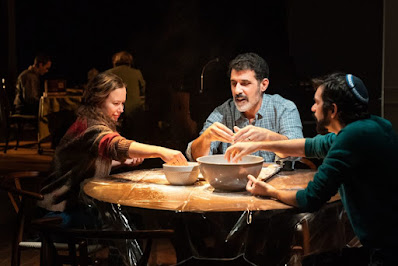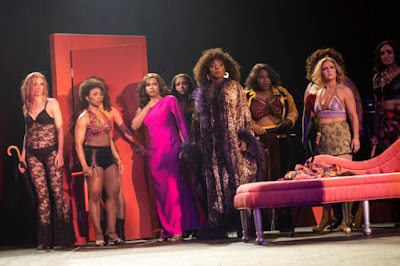3/15/22: Notes From Now
What: Prospect Theater Company presents a song cycle about surviving the pandemic, written by a host of theater writers, and performed by a diverse cast.
And? Uneven but not unpleasant. Understudy Genesis Adelia Collado is particularly striking and poignant in their songs ("Soon" by Michelle J. Rodriguez and "Under the Snow" by Georgie Castilla and Jaime Lozano), and Josh Lamon is ticklishly funny in his ("Ovid" by Jeff Blumenkrantz and "Coming Back to You" by Peter Mills).
 |
| Ashley Blanchet, center, and cast. Photo source. |
3/16/22: Prayer for the French Republic
What: MTC presents Joshua Harman's new play, about several generations of a Jewish family living in Paris, France and their longstanding legacy of surviving persecution while selling pianos. The play covers both the recent present (2016ish) and during and immediately after World War II.
And? To be a Jew is to be the descendant of the survivor of a pogrom. Of a massacre. Of a genocide. This is what I kept thinking while watching Harman's powerful play, beautifully directed and staged by David Cromer, with a consistently superb ensemble (special praise for Kenneth Tigar as Adolphe and Francis Benhamou as Elodie). I thought of my own family, and what we escaped (or didn't). My great-grandmother came to America using the one ticket her family could afford, a ticket that was bought for her oldest sister. Her sister chose to stay; my great-grandmother took the ticket. That choice is the reason I exist. It is also the reason my great-grandmother lost her entire family. To stay or to go--to stay in your home with your loved ones, with the language you know, or to leave it all behind because you are not sure it is safe to exist as you are, where you are--this is the central question and argument of the play. Teenage Pierre's grandparents chose to stay during the war, as the generations of their family behind them had, and miraculously survived German occupation. Pierre and his father, who also stayed, had to watch the rest of their family be destroyed in the camps. A generation later, Pierre's middle aged daughter Marcelle and her adult children are sadly reckoning with the same question, in a France that is feeling more and more inhospitable to Jews. Her son Daniel, the only family member to wear a visible signal of his Judaism (his kipa), has been attacked more than once, and they are considering joining the 8,000 other Jews who have fled France for Israel.
Throughout the play Marcelle's acerbic brother Patrick speaks to us, not only his family's history, but also of historic moments of Jewish persecution (the smaller forgotten ones that get quiet plaques), even as in the present day his sister grapples with her terror over the increasing count of hate crimes against Jews in Europe. I saw the show on the night of Purim, a holiday commemorating our escape from destruction by Persian vizier Haman. Purim is a night of celebration and feasting. The night I went, I sat surrounded by a denser population of Hebrew speakers than I've encountered since my last trip to Israel. The night I went (and, I assume most nights), the end of each of the three acts is accompanied by sniffling and weeping from the majority of the audience. This fear, this confusion, this recognition that this is our story, permeates the space. I do not know how it is to see this play as a gentile. But as a Jew, I felt seen, I felt mirrored, as the argumentative family delved not only into their own personal experiences and fears but the larger sociological implications of the resurging antisemitism, the overlap with any dialog regarding the Israel-Palestine conflict, and the feeling of isolation, of having no true allies on either the Left or the Right of the political divide, of sitting terrified in the growing chasm, wondering "where is it safe for us to exist?" Wondering if we are always destined to be a wandering people.
This production's been getting a lot of acclaim, and for good reason. I'm so grateful it extended enough times that I was able to see it.
 |
| Molly Ranson, Jeff Seymour, and Yair Ben-Dor as Molly, Charles, and Daniel. Photo by |
3/17/22: Help
What: The Shed presents a new play by Claudia Rankine, based on conversations she's had with white people (especially white men) in the liminal space of airplanes and airports, asking questions not about how they view her Blackness, but how they view their own whiteness.
And? Speaking of looking for a safe space to exist. In Help, April Mattis plays the lone Black voice and face in a sea of white suited strangers. Rankine (and the Narrator, her presumptive stand-in in the play) seeks not to make her Blackness the most important aspect of her conversations, but to have white people acknowledge that which they take for granted, the passport granted by their invisible-but-highly-visible whiteness which grants them easier travel through public spaces. She has to continually navigate other people's whiteness, just to even exist in the world, where even her presence in the first class line causes a double take. There's been an uptick this past season of plays by Black authors that are quite explicitly aimed at white audiences. That's not to say they're exclusive from a Black audience, but they're acknowledging that white people still dominate the theater-going space, at least in New York, and this is a conversation to which they need to bear witness. Help is elegantly constructed and intricately directed and staged by Taibi Magar (dir) and Shamel Pitts (choreo), all in a gorgeous scenic design by the brilliant Mimi Lien, a space that is sometimes an airport lounge, sometimes a void of chaos, sometimes an observation room.
 |
| April Mattis as Narrator. Photo by Kate Glicksberg. |
3/18/22: The Life
What: City Center Encores! presents a revisal of the Coleman-Gasman-Newman musical about sex workers and their abusive pimps in 1980s New York.
And? This production is earning itself a lot of controversy, particularly around its extensive rewrites and some of its representation. I've already written about my thoughts with revisals, and probably can't add much value to that element of the conversation here, not knowing the original show at all. And I know it's not my space to speak regarding the problematic representation and language in the show. I will say that the addition of a narrator--an older Jojo--feels irritatingly apologetic, as if they need to really make sure we know Flashback Jojo is a bad guy (thanks, but we figured that out by watching him in action) but also a sideways attempt to retroactively redeem him (see? he feels really bad about it twenty years later!), which to me misses the point. I don't quite know how to have an opinion about the show itself beyond that and the truth is I didn't walk away with a strong sense of it. It's fine. Some of the songs are great. Billy Porter staged it pretty well. It was great (especially after Tap Dance Kid's misstep with erasing Emma's fatness) to see fat bodies celebrated onstage as sexy. And oh, the voices. Though Encores may have strayed from their original mission statement with their current season, you can always count on them to let us hear amazing voices singing these scores. Of particular highlight are the two leading women, Alexandra Grey as Queen and Ledisi as Sonja, as well as Antwayn Hopper as the brutal Memphis (hot damn, his low notes). As Young Jojo, Mykal Kilgore is always a vocal treat, but his mic was up too high the night I went, which made it a bit painful to listen to him belt out his high notes.
 |
| Ledisi, center, as Sonja, with the cast of The Life. Photo by Joan Marcus. |
3/19/22: Discus
What: Hunger and Thirst present a new play by Becca Schlossberg, a retelling of the love story of Apollo and Hyacinth.
And? Lovely play. Full review here.
 |
| Victoria Fragnito and Philip Estrera as Hades and Apollo. Photo by Al Foote. |
No comments:
Post a Comment